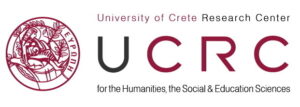Saturday, 20 November 2021
Panel 6
Crete 10.10
Madrid 09.10
Lisbon 08.10
Experiences and Perspectives by and for young people during the dictatorship
Chair. Eleni Fournaraki

Eleni Fournaraki is Associate Professor in Modern Social History, in the Department of Sociology, at the University of Crete. Her main research interests include the following historical fields: gender history; cultural history of education and youth history; gender, class and citizenship; bodily culture and sport. On these historical domains she has published several articles in historical journals and co-edited three collected volumes (one of them in English). Her current writings concern women’s bodily culture as a field involving issues of gender difference, social distinction and nationalism. She makes part of the Group of Editors (since 2009) of Aspasia, The International Yearbook of Central, Eastern, and Southeastern European Women’s and Gender History (New York, Oxford, Berghahn Books).
Kostas Katsapis, "Children and “neglected children” of the Dictatorship. A cultural approach"
The term “Chlidren of Dictatorship” derives from the well-known research of Kostis Kornetis and characterizes the radical youth of the student movement. But we must recognize that these children were not the only children of this difficult era. Alongside of them, thousands of young people had a strong relation with the cultural revolution of the late sixties. In our research, we consider them as the “neglected children of the Dictatorship”. Besides them and if we want to be honest, we must pay attention to the vast majority of the youth during the Regime of the Colonels. Young people without political activity, people who never had an interest about the American underground culture, members of the working class who cared only about their families and their jobs. These are not the neglected children, these are the “bastards” of the academic History, maybe because it is not easy to document their life or to deal with their cultural identities and political impact.
 Kostas Katsapis (1973) is a historian and teaches Cultural History of the postwar Greek society and History of the Youth at Panteion University. He also teaches Public History at the Hellenic Open University. Kostas Katsapis is author of five books about the social and cultural history of postwar period, such as his last book: Words of fire. Diaries and radical writing in the dawn of Metapolitefsi. His experimental working project (with the title: Australia: eight stories) focuses on the social history of the Greek immigrants in Sydney during the first postwar decades.
Kostas Katsapis (1973) is a historian and teaches Cultural History of the postwar Greek society and History of the Youth at Panteion University. He also teaches Public History at the Hellenic Open University. Kostas Katsapis is author of five books about the social and cultural history of postwar period, such as his last book: Words of fire. Diaries and radical writing in the dawn of Metapolitefsi. His experimental working project (with the title: Australia: eight stories) focuses on the social history of the Greek immigrants in Sydney during the first postwar decades.
Eleni Kouki, "Lessons from May 1968. The 21st April Dictatorship view on youth uprisings"
The dictatorship of April 21, at least the circles that aspired to shape its ideology, closely followed the events of May 1968 in France. They tried to understand them, based on their own authoritarian and anti-communist perception, and subsequently to use them to their advantage, to design their own domestic policies. In this paper, we will first present the articles of the Free World, the foremost pro-regime newspaper of that period, and we will analyze how the uprising was represented day by day. Next, we present Georgios Georgalas’ book, The Crisis of Consumer Society, published in 1971. In it, Georgalas, who at the time was trying to rise to the top echelons of the dictatorial government, attempts a comprehensive analysis of the ‘decline’ of Western society. According to Geogalas the youth uprisings that had occurred in the previous years were a fundamental symptom of this decline. Accordingly, it proposes solutions for Greece to deal with similar problems. These texts produced by supporters and functionaries of the regime allow us to ask questions about the ideology and the cultural environment of the dictatorship, its strategy in terms of communication both at home and abroad.
 Eleni Kouki studied history at the Department of History and Archeology of the School of Philosophy of Ioannina. In her Ph.D., which she completed in 2016 at the Department of History and Archeology of the School of Philosophy of EKPA, she focused on the monuments and ceremonies of the April 21st Dictatorship. Her research interests range from Greek post-WWII history, monuments, and political rituals to memory in general and public history. She has participated as a researcher in various research projects and has published her work in collective volumes and academic journals. She teaches in the postgraduate program of Public History at the Hellenic Open University. She has worked as a journalist for more than a decade specializing in cultural issues.
Eleni Kouki studied history at the Department of History and Archeology of the School of Philosophy of Ioannina. In her Ph.D., which she completed in 2016 at the Department of History and Archeology of the School of Philosophy of EKPA, she focused on the monuments and ceremonies of the April 21st Dictatorship. Her research interests range from Greek post-WWII history, monuments, and political rituals to memory in general and public history. She has participated as a researcher in various research projects and has published her work in collective volumes and academic journals. She teaches in the postgraduate program of Public History at the Hellenic Open University. She has worked as a journalist for more than a decade specializing in cultural issues.
Eleni Kouki, post-doc researcher, Panteion University, Teaching Fellow at the post-graduate program Public History, Hellenic Open University
Panel 7
Crete 10.45
Madrid 09.45
Lisbon 08.45
Narratives of resistance against the dictatorship
Chair. Hara Kouki

Hara Kouki is an elected assistant professor at the Sociology Dept. of the University of Crete and also lectures at the MA Social Solidarity Economy of the Hellenic Open University. Trained as a historian at the University of Athens, Hara completed her PhD at Birkbeck College (University of London) and has worked as a research fellow at the European University Institute (Florence), at Durham University and at Newcastle University.
Nikos Serdedakis, "Activists’ Autobiographical narratives of dynamic anti-junta resistance"
Most of the research on anti-junta collective action in Greece usually focuses on the major events of protest against the dictatorship and in particular on the anti-dictatorial student movement of the period 1972-1973. Less attention has been given to resistance actions under- taken immediately after the imposition of the military regime. Young activists, radicalized during the contentious events of 1965, immediately after the first wave of arrests and repression, will form organizations, promoting symbolic violence as a means of active resistance to the dictatorship. Initially, I will present data regarding the actions undertaken by the dynamic resistance organizations, throughout 1967-1974. Subsequently, two published autobiographical texts of dynamic resistance activists will be analyzed. The analysis of these autobiographical narratives can help us to shed light on the reasons that led young activists to engage in high risk collective action.
 Nikos Serdedakis is an Assistant Professor in the Department of Sociology at the University of Crete, Rethymno, Greece. His academic interests and research focus on new social movements, protest events and collective action. The research on the protest events in Greece during the period 2009-2014, which took place under his supervision in the Department of Sociology led to the publication of the collective volume Aspects of the Greek crisis. Contentious cycle of protest and institutional outcomes. Athens: Gutenberg. 2018.
Nikos Serdedakis is an Assistant Professor in the Department of Sociology at the University of Crete, Rethymno, Greece. His academic interests and research focus on new social movements, protest events and collective action. The research on the protest events in Greece during the period 2009-2014, which took place under his supervision in the Department of Sociology led to the publication of the collective volume Aspects of the Greek crisis. Contentious cycle of protest and institutional outcomes. Athens: Gutenberg. 2018.
Yiannis Karayiannis, "Politics as resistance, the resistance as politics: (re)constructions of the collective past through individual narratives"
The presentation examines testimonies of individuals who participated in the uprising of the Polytechnic University in November 1973. It analyses the narrative and rhetorical strategies by which these events are (re)constructed and their specific meanings are formed. The study focuses on various meanings of the resistance, as well as on representations of the historical experience that renders the “Polytechnic” a decisive milestone: both individually (formative socialization event) and collectively (a top event of mass political mobilization). Emphasis is placed on storytelling that forms the uniqueness of the Polytechnic” and seeks to protect it from (later) political exploitations (the political situation and developments after the collapse of dictatorship; the armed struggle on behalf of the “Polytechnic”; the political violence; the specific interpretations of the historical events in the uprising of the Polytechnic University, etc).
 Yiannis Karayiannis is a Political Scientist and teaches at the Department of Political Science of the University of Crete. His research interests concern the basic fields of contemporary political analysis and include practices of government and power, political discourse analysis, Greek politics, political and party competition in a comparative perspective, the political communication, as well as issues related to political methodology and concepts analysis. He has served as General Secretary in the Hellenic Political Science Association (HPSA), was a member of the Editorial Team of the Greek Political Science Review and has participated in the establishment of the Thematic Network “Political Discourse Analysis”. He recently supervised a research program on the political discourse of the Church of Greece whilst his latest work is a book under publication on populism in Greece.
Yiannis Karayiannis is a Political Scientist and teaches at the Department of Political Science of the University of Crete. His research interests concern the basic fields of contemporary political analysis and include practices of government and power, political discourse analysis, Greek politics, political and party competition in a comparative perspective, the political communication, as well as issues related to political methodology and concepts analysis. He has served as General Secretary in the Hellenic Political Science Association (HPSA), was a member of the Editorial Team of the Greek Political Science Review and has participated in the establishment of the Thematic Network “Political Discourse Analysis”. He recently supervised a research program on the political discourse of the Church of Greece whilst his latest work is a book under publication on populism in Greece.
Break
Panel 8
Crete 11.45
Madrid 10.45
Lisbon 09.45
The Greek political context and the movement against the dictatorship
Chair. Stavroula Tsinorema
 Professor of Modern & Contemporary Philosophy and Bioethics, Director of Joint Graduate Programme “Bioethics” and Director of the Centre for Bioethics of the University of Crete. She has acted twice as Head of the Department of Philosophy and Social Studies, as Head of the Division of Philosophy of the same Department, and Director of Studies of Joint Graduate Programme “Philosophy: Science, Values & Society”. She was the founding Director of the Centre for Philosophical Research and Translation of the University of Crete. She holds a First Class Honours Degree in Philosophy from the Department of Philosophy, University of Athens, followed by M.A. in Moral and Social Philosophy from the University of Exeter and Ph.D. in Moral Philosophy from the same University. She has held a Committee of Vice-Chancellors and Principals Award (UK), Exeter University Scholarship (UK), and A.K. Mellon Foundation Fellowship (USA). Before coming to Crete, she taught at the University of Ioannina, Greece, and University of Exeter, UK. She has held visiting posts/fellowships at the Universities of Leeds, Pittsburgh (Center for Philosophy of Science), Oxford (St. John’s College), Texas at Austin, London School of Economics and Political Sciences (Centre for Philosophy of the Natural and Social Sciences), University of London (Institute of Philosophy Fellowship ), Stanford University.
Professor of Modern & Contemporary Philosophy and Bioethics, Director of Joint Graduate Programme “Bioethics” and Director of the Centre for Bioethics of the University of Crete. She has acted twice as Head of the Department of Philosophy and Social Studies, as Head of the Division of Philosophy of the same Department, and Director of Studies of Joint Graduate Programme “Philosophy: Science, Values & Society”. She was the founding Director of the Centre for Philosophical Research and Translation of the University of Crete. She holds a First Class Honours Degree in Philosophy from the Department of Philosophy, University of Athens, followed by M.A. in Moral and Social Philosophy from the University of Exeter and Ph.D. in Moral Philosophy from the same University. She has held a Committee of Vice-Chancellors and Principals Award (UK), Exeter University Scholarship (UK), and A.K. Mellon Foundation Fellowship (USA). Before coming to Crete, she taught at the University of Ioannina, Greece, and University of Exeter, UK. She has held visiting posts/fellowships at the Universities of Leeds, Pittsburgh (Center for Philosophy of Science), Oxford (St. John’s College), Texas at Austin, London School of Economics and Political Sciences (Centre for Philosophy of the Natural and Social Sciences), University of London (Institute of Philosophy Fellowship ), Stanford University.
Seraphim Seferiades, “The Political Context: Contentious Politics and Movement Outcomes in the Greek 60s”
My goal in this –still evolving— research is to employ contemporary Contentious-Politics theory to shed light (highlight, problematize and explicate) features of the Greek 60s: a period extremely rich in causal mechanisms characterizing social protest but also processes pertaining both to democra- tization and its opposite (democratic hollowing). The cognitive orientation, however, is bi-directional: it involves exploring both how theory helps us understand the Greek case, and how the Greek case helps us refine theory. I first examine the ways in which the ‘contentious cycle’ problématique helps us analyze (a) organizations; (b) frames; (c) collective-action repertoires; and (d) contentious diffusion. I then move to an explanatory synthesis relating the contentious cycle to the underlying –and changing— Political Opportunity Structure, and conclude by tentatively generalizing about the relationship existing between contentious mobilization and democratization. Throughout the processes addressed, the role of youth mobilization has been of paramount im- portance. Considering that a good deal of it was what we often call ‘spontaneous’, emphasis is also placed on the importance of strategic action
 Seraphim Seferiades (PhD Columbia ‒http://seferiadescv.blogspot.gr) is (elected) Professor of Political Science at the Panteion University of Social and Political Science, Director of the Laboratory on Contentious Politics (https://lcp.panteion.gr/) and Life Member in Politics and History at the University of Cambridge (CLH). For several years the Secretary of the Greek Political Science Association, he has been Senior Member at the University of Oxford (St Peter’s College), Fellow and Tutor in the Arts at the University of Cambridge (CHU), Jean Monnet Fellow at the European University Institute, and Hannah Seeger Davis Fellow at Princeton University. His most recent book is Populism, Democracy, the Left: the Challenge of the Method (Athen: Topos 2021) ‒ https://bit.ly/3DZd3t1.
Seraphim Seferiades (PhD Columbia ‒http://seferiadescv.blogspot.gr) is (elected) Professor of Political Science at the Panteion University of Social and Political Science, Director of the Laboratory on Contentious Politics (https://lcp.panteion.gr/) and Life Member in Politics and History at the University of Cambridge (CLH). For several years the Secretary of the Greek Political Science Association, he has been Senior Member at the University of Oxford (St Peter’s College), Fellow and Tutor in the Arts at the University of Cambridge (CHU), Jean Monnet Fellow at the European University Institute, and Hannah Seeger Davis Fellow at Princeton University. His most recent book is Populism, Democracy, the Left: the Challenge of the Method (Athen: Topos 2021) ‒ https://bit.ly/3DZd3t1.
Giorgos Tsiridis, “The repressive equilibrium in dictatorial Greece: informal broadenings and formal milestones of youth mobilization”
The various manifestations of civil society – illegal movement organizations, legal challengers, informal collectives, and the anti-dictatorial student movement – have emerged and acted at different historical junctures, presenting a diversity in their repertoire of action in correspondence to the regime’s shifting oppression practices. The colonels themselves notedly used the term «liberalization» [fileleftheropeisi] since the beginning of their rule, even before it was established in international literature as a factor of democratization. Their attempt of a controlled political liberalization stimulated the adaptive reflexes of collective challengers, especially within the youth, who swiftly interpreted the partial state disengagement from the public sphere as a political opportunity and adjusted their resistance practices accordingly. This equilibrium between state oppression and youth mobilization eventually led to the Polytechnic student uprising, a major political event of the Greek transitional experience.
 Giorgos Tsiridis graduated from the Department of History and Archaeology of the Aristotle University of Thessaloniki. He continued his studies in Utrecht, The Netherlands in the field of Comparative History, and in 2017 he supported his Doctoral Thesis at the Department of Political Science and Public Administration of the University of Athens. Since May 2020, he is a postdoctoral researcher at the Department of Sociology of the University of Crete. His research focuses on “Political liberalization in the colonels’ dictatorship: political opportunities and institutional traces of collective action”
Giorgos Tsiridis graduated from the Department of History and Archaeology of the Aristotle University of Thessaloniki. He continued his studies in Utrecht, The Netherlands in the field of Comparative History, and in 2017 he supported his Doctoral Thesis at the Department of Political Science and Public Administration of the University of Athens. Since May 2020, he is a postdoctoral researcher at the Department of Sociology of the University of Crete. His research focuses on “Political liberalization in the colonels’ dictatorship: political opportunities and institutional traces of collective action”
Efthimios Papavlasopoulos, Thomas Lazaridis & Mania (Maria) Sotiropoulou, “’I swear never to obey to tyrants’. The actions of youth anti-dictatorship organizations abroad and within the country: the cases of EPES (Association des Etudiants Hellenes de Paris) and the PAOS (Panhellenic Anti-Dictatorship Students Organization) ‘Rigas Feraios’”
The attitude of Greek society towards the dictatorial regime is one of the least studied fields of the Third Hellenic Republic. In the “Metapolitefsis” (post-Junta era), in the resistance narrative, Youth was on center stage, especially during the Athens Polytechnic uprising. That describes the «myth» of resistance, on a symbolic level; as it was the beginning of the fall of the military dictatorship. The limited literature and the scattered empirical evidence document two resistance poles: one abroad (mass and dynamic) and one within the country (limited and sporadic). Also, the role of the international personalities and collectives in strengthening the resistance movement
and in the delegitimization of the regime is highlighted. This paper will attempt to illuminate aspects of Youth resistance, by focusing on the first period of the “Junta” (1967-1971); in this period the regime tried to stabilize and legitimize itself. Our aim is to map the communication channels, the coordination forms of the resistance actions of Youth organizations that acted inside the country and abroad and the initiatives they undertook for the internationalization of the “Greek issue”. Based on the research findings, we will evaluate the efficacy, the limits and the contradictions of their actions.
We will examine through the political, ideological, cultural and theoretical context the demands and repertoire of actions of the youth movement in comparison with the pro-dictatorship era. The EPES (Association des Étudiants Hellenes de Paris) and the PAOS (Panhellenic Anti-Dictatorship Students Organization) “Rigas Feraios” are our case studies. Both organizations developed in the early dictatorship era and had remarkable anti-Junta activity and established communication networks. In both cases, the current research is lacking significant empirical evidence of their actions.
Our study was based on the thematic analysis of their publications (magazines,
newspapers etc.) and interviews with their leaders. The findings of the research aim to contribute to understanding the processes of transition from authoritarian regime and the political-institutional arrangements that laid the foundations of the Third Hellenic Republic.
 Dr. Efthimis Papavlasopoulos is a assistant professor in the Department of Political Science at the University of Crete. He studied Law and Political Sciences at the University of Thessaloniki. He has published on Greek politics and comparative party systems and has taught political science and political sociology in the Law Faculty at the University of Thessaloniki, the Department of Social and Education Policy of the University of the Peloponnese and the Department of Political Science and Public Administration of the University of Athens
Dr. Efthimis Papavlasopoulos is a assistant professor in the Department of Political Science at the University of Crete. He studied Law and Political Sciences at the University of Thessaloniki. He has published on Greek politics and comparative party systems and has taught political science and political sociology in the Law Faculty at the University of Thessaloniki, the Department of Social and Education Policy of the University of the Peloponnese and the Department of Political Science and Public Administration of the University of Athens
 Thomas Lazaridis is a PhD Candidate at University of Crete (UoC). His dissertation examines the relation between Right and Far-Right in Greek political system after 1974 (Metapolitefsis). He holds a MA in Political Sociology and Comparative Politics from Panteion University of Athens (2020) and a BA in Political Science from UoC. His current research interests focus on the Far-Right parties and politics and the Greek political and party system.
Thomas Lazaridis is a PhD Candidate at University of Crete (UoC). His dissertation examines the relation between Right and Far-Right in Greek political system after 1974 (Metapolitefsis). He holds a MA in Political Sociology and Comparative Politics from Panteion University of Athens (2020) and a BA in Political Science from UoC. His current research interests focus on the Far-Right parties and politics and the Greek political and party system.
 Mania Sotiropoulou is a PhD candidate in Political Science, University of Crete. She holds a Master’s Degree in Political Science and Sociology, University of Athens and a Master in Research of Political Science, Universitat Pompeu Fabra-Barcelona. She graduated from the Department of Political Science and Public Administration, University of Athens. She has participated in research projects of oral history, recording and study of the political staff in the local government in the 2019 elections, as well as study of the political discourse of the parties for the consumption during the period 2010-2017.
Mania Sotiropoulou is a PhD candidate in Political Science, University of Crete. She holds a Master’s Degree in Political Science and Sociology, University of Athens and a Master in Research of Political Science, Universitat Pompeu Fabra-Barcelona. She graduated from the Department of Political Science and Public Administration, University of Athens. She has participated in research projects of oral history, recording and study of the political staff in the local government in the 2019 elections, as well as study of the political discourse of the parties for the consumption during the period 2010-2017.
Panel 9
Crete 12.45
Madrid 11.45
Lisbon 10.45
The movement against the dictatorship outside of Greece & the European integration
Chair. Aspasia Chatzidaki
 Aspasia Chatzidaki is Professor of ‘Bilingualism and Greek as a second language’ at the Department of Primary Education, University of Crete. Her research interests include the study of sociolinguistic and educational dimensions of bilingualism and teaching approaches to the Greek language as an L2 both in Greece and among Diaspora Greeks. She has published widely on issues of minority language maintenance and inclusive/ empowering approaches to education with regard to bilingual students.
Aspasia Chatzidaki is Professor of ‘Bilingualism and Greek as a second language’ at the Department of Primary Education, University of Crete. Her research interests include the study of sociolinguistic and educational dimensions of bilingualism and teaching approaches to the Greek language as an L2 both in Greece and among Diaspora Greeks. She has published widely on issues of minority language maintenance and inclusive/ empowering approaches to education with regard to bilingual students.
Nikolaos Papadogiannis, “Anti-dictatorial struggle, young and older Greek migrants in West Germany and the Politicisation of Music”
This paper examines the emotional experiences connected with the entehno laiko music composed by Mikis Theodorakis that was immensely popular among a significant proportion of Greek migrants of diverse ages living in West Germany in 1967-1974. Drawing on the conceptual framework put forth by Barbara Rosen- wein, the presentation argues that the performance of those songs was conducive to the making of a (trans)national emotional community. On the one hand, initially for Greek left-wingers and, after 1967, also for Greek centrists, who resided in West Germany, collective singing of music composed by Theodorakis served as a means of ‘overcoming fear’ and forging committed militants who struggled for the social and political trans- formation of their country of origin. On the other, from the late 1960s onwards those migrants increasingly enacted this emotional community with local activists from West Germany as well.
 Nikolaos Papadogiannis obtained his PhD in History from the University of Cambridge in 2010. He has subsequently worked at the Humboldt University of Berlin, University of St Andrews and Bangor University. His research interests cover the history of sexuality, gender, youth, travel, migration and protest cultures. His monograph Militant around the Clock? Left-wing Youth Politics, Leisure and Sexuality in post-dictatorship Greece, 1974-1981 was published by Berghahn Books in 2015. He is currently the Principal Investigator in a project on transnational AIDS activism in Western Europe, project which is funded by the Arts and Humanities Research Council (UK).
Nikolaos Papadogiannis obtained his PhD in History from the University of Cambridge in 2010. He has subsequently worked at the Humboldt University of Berlin, University of St Andrews and Bangor University. His research interests cover the history of sexuality, gender, youth, travel, migration and protest cultures. His monograph Militant around the Clock? Left-wing Youth Politics, Leisure and Sexuality in post-dictatorship Greece, 1974-1981 was published by Berghahn Books in 2015. He is currently the Principal Investigator in a project on transnational AIDS activism in Western Europe, project which is funded by the Arts and Humanities Research Council (UK).
Antonis Sarantidis, “On the threshold of two worlds: Greek students and the anti-dictatorial struggle in Western Europe (1967-1974)”
During 1967-1974, the activism of a significant part of youth in Greece, especially the students, focused on the resistance against the dictatorial regime. Their contribution, despite the lack of freedoms and the brutality of the authorities, was crucial in the development of the anti-dictatorial struggle. But how did the fact of the overthrow of the democracy in Greece affect and set new conditions in the claims of Greek students who at that time were studying abroad? This question is particularly important if we take into account that the «long ‘60s», especially in Western Europe, were characterized by the emergence of new social movements, which were mainly associated with the youth and the student world. The announcement will outline the characteristics of the Greek student movement and the anti-dictatorship struggle as it was formed in Western Europe, focusing on the examples of England, France, West Germany and Italy.
 Antonis Sarantidis graduated from the faculty of History/Archaeology of the National and Kapodistrian University of Athens in 2014. He received his Master in History (N.K.U.A.) in 2017 with the thesis “The Union of Greek Students in Paris (EPES) during the Greek dictatorship and the journal Poreia (1967-1972)”. He is a PhD candidate in Contemporary Greek History (N.K.U.A.) since 2019. His research interests focus on the Greek student migration in Western Europe during the ‘60s and the anti-dictatorial movement abroad (1967-1974).
Antonis Sarantidis graduated from the faculty of History/Archaeology of the National and Kapodistrian University of Athens in 2014. He received his Master in History (N.K.U.A.) in 2017 with the thesis “The Union of Greek Students in Paris (EPES) during the Greek dictatorship and the journal Poreia (1967-1972)”. He is a PhD candidate in Contemporary Greek History (N.K.U.A.) since 2019. His research interests focus on the Greek student migration in Western Europe during the ‘60s and the anti-dictatorial movement abroad (1967-1974).
Kostas Kanellopoulos, “The process of European integration in Greece and youth activism during and after the military dictatorship of 1967-1974”
In June 1961 the Greek government and the European Economic Community (EEC) signed an Association Agreement. This was the first Association Agreement concluded by the EEC. This Agreement, which was essentially the first step in Greece’s path to the accession to the European Community, «froze» with the imposition of the military dictatorship in Greece (April 1967) and redeveloped after the restoration of democracy (July 1974). Although Greece finally joined the EEC in 1981 the effects of the dictatorship to the country’s integration to European economy were devastating. In this paper we examine how European integration was perceived and dealt by youth activism and the students’ movement during the dictatorship and until the first years of the democratic restoration.
 Dr. Kostas Kanellopoulos ((Ph.D. Panteion University 2009) is the Principal Investigator of the research project “EUROPOLITY – The Politicization of European Integration in the Greek public discourse, 1974-2019” at the University of Crete, Department of Sociology (http://europolity.soc.uoc.gr/index.php/en/). He has taught at the University of Crete, the University of Athens, the University of Peloponnese, at Democritus University of Thrace and at the Hellenic Open University. He has served three times as the Secretary General of the Hellenic Political Science Association (2016-today).
Dr. Kostas Kanellopoulos ((Ph.D. Panteion University 2009) is the Principal Investigator of the research project “EUROPOLITY – The Politicization of European Integration in the Greek public discourse, 1974-2019” at the University of Crete, Department of Sociology (http://europolity.soc.uoc.gr/index.php/en/). He has taught at the University of Crete, the University of Athens, the University of Peloponnese, at Democritus University of Thrace and at the Hellenic Open University. He has served three times as the Secretary General of the Hellenic Political Science Association (2016-today).
Lunch
Roundtable
Crete 14.15
Madrid 13.15
Lisbon 12.15
Youth resisting dictatorship: a comparative view
Co-Chairs. Maria Kousis & Guya Accornero
 Maria Kousis (PhD, The University of Michigan, 1984) is Professor of Sociology. She was coordinator or partner in European Commission research projects including “Grassroots Environmental Action”, TEA, PAGANINI and MEDVOICES. Publications consist of 11 edited volumes, books and special issues as well as 68 articles or book chapters, including the two-volume Special Issue of American Behavioral Scientist on Mediterranean Political Processes in Historical-Comparative Perspective (Tilly, C., R. Franzosi and M. Kousis, eds. 2008) and the special section Alternative Forms of Resilience Confronting Crisis in Southern Europe: A Social Movement Perspective, in PArtecipazione e COnflitto (guest editor, 2017). Her research centers on Social Change, Contentious Politics, Environmental Politics, Bioethics, Social Movements in times of Crises and Southern Europe. Her current research focuses on the socio-economic and political dimensions of crises, especially in the context of the GGCRISI (Greek-German Ministries Cooperation), LIVEWHAT (FP7), TransSOL (H2020) and EURYKA (H2020) projects.
Maria Kousis (PhD, The University of Michigan, 1984) is Professor of Sociology. She was coordinator or partner in European Commission research projects including “Grassroots Environmental Action”, TEA, PAGANINI and MEDVOICES. Publications consist of 11 edited volumes, books and special issues as well as 68 articles or book chapters, including the two-volume Special Issue of American Behavioral Scientist on Mediterranean Political Processes in Historical-Comparative Perspective (Tilly, C., R. Franzosi and M. Kousis, eds. 2008) and the special section Alternative Forms of Resilience Confronting Crisis in Southern Europe: A Social Movement Perspective, in PArtecipazione e COnflitto (guest editor, 2017). Her research centers on Social Change, Contentious Politics, Environmental Politics, Bioethics, Social Movements in times of Crises and Southern Europe. Her current research focuses on the socio-economic and political dimensions of crises, especially in the context of the GGCRISI (Greek-German Ministries Cooperation), LIVEWHAT (FP7), TransSOL (H2020) and EURYKA (H2020) projects.
 Guya Accornero is an Assistant Professor in Political Science at the Lisbon University Institute (ISCTE-IUL) and Integrated Researcher at the Centre for Research and Studies in Sociology (CIES-IUL), where she co-coordinates the Research Group on ‘Politics and Citizenship’ and is an elected member of the Scientific Commission. She is the Principal Investigator of the FCT funded Project ‘HOPES: HOusing PErspectives and Struggles’, and co-chair of the Council of European Studies Research Network Social Movements. She has published articles in journals including Current Sociology, Mobilization, Social Movement Studies, Journal of Contemporary Religion, West European Politics, Estudos Ibero-Americanos, Democratization, Cultures et Conflits, Análise Social, Storia e Problemi Contemporanei, Historein. Her monography ‘The Revolution before the Revolution’ and the book she co-edited with Olivier Fillieule ‘Social Movement Studies in Europe’ were both published in 2016 by Berghahn. She has been teaching courses on social movements, democracy, citizenship, political culture and digital era. Her main research and teaching interests are: political and social mobilization processes, protest and activism’s long term outcomes (both on politics and society, and on activists’ biographies), radicalization and political violence, public order and policing protest, urban movements for the right to housing and to the city, gentrification and urban change.
Guya Accornero is an Assistant Professor in Political Science at the Lisbon University Institute (ISCTE-IUL) and Integrated Researcher at the Centre for Research and Studies in Sociology (CIES-IUL), where she co-coordinates the Research Group on ‘Politics and Citizenship’ and is an elected member of the Scientific Commission. She is the Principal Investigator of the FCT funded Project ‘HOPES: HOusing PErspectives and Struggles’, and co-chair of the Council of European Studies Research Network Social Movements. She has published articles in journals including Current Sociology, Mobilization, Social Movement Studies, Journal of Contemporary Religion, West European Politics, Estudos Ibero-Americanos, Democratization, Cultures et Conflits, Análise Social, Storia e Problemi Contemporanei, Historein. Her monography ‘The Revolution before the Revolution’ and the book she co-edited with Olivier Fillieule ‘Social Movement Studies in Europe’ were both published in 2016 by Berghahn. She has been teaching courses on social movements, democracy, citizenship, political culture and digital era. Her main research and teaching interests are: political and social mobilization processes, protest and activism’s long term outcomes (both on politics and society, and on activists’ biographies), radicalization and political violence, public order and policing protest, urban movements for the right to housing and to the city, gentrification and urban change.
Roundtable
 Priska Daphi is Professor of Conflict Sociology at Bielefeld University, Germany, and co-founder of the Institute for Protest and Social Movements Studies in Berlin. Her research focusses on social movements and civil society in Europe with a particular interest in collective memory, identity, coalition building, transnational activism and space. She is co-editor of Social Movements, Cultural Memory and Digital Media: Mobilising Mediated Remembrance (Palgrave, 2020 – with Samuel Merrill & Emily Keightley) and author of Becoming a Movement. Identity, Narrative and Memory in the European Global Justice Movement (Rowman & Littlefield International, 2017). She is coordinating editor of Social Movement Studies.
Priska Daphi is Professor of Conflict Sociology at Bielefeld University, Germany, and co-founder of the Institute for Protest and Social Movements Studies in Berlin. Her research focusses on social movements and civil society in Europe with a particular interest in collective memory, identity, coalition building, transnational activism and space. She is co-editor of Social Movements, Cultural Memory and Digital Media: Mobilising Mediated Remembrance (Palgrave, 2020 – with Samuel Merrill & Emily Keightley) and author of Becoming a Movement. Identity, Narrative and Memory in the European Global Justice Movement (Rowman & Littlefield International, 2017). She is coordinating editor of Social Movement Studies.
 Kostis Karpozilos is the director of the Contemporary Social History Archives (ASKI). His current work concerns the transnational worlds of Greek communism focusing on experiences of displacement, exile, and mobility. He is the author of “Red America: Greek Immigrants and the Quest for a New World, 1900-1950” (Crete University Press, 2017/Berghahn Books, forthcoming) and co-author (with Dimitris Christopoulos) of “10+1 questions and answers on the Macedonian Question”, (Rosa Luxemburg Stiftung, 2018).
Kostis Karpozilos is the director of the Contemporary Social History Archives (ASKI). His current work concerns the transnational worlds of Greek communism focusing on experiences of displacement, exile, and mobility. He is the author of “Red America: Greek Immigrants and the Quest for a New World, 1900-1950” (Crete University Press, 2017/Berghahn Books, forthcoming) and co-author (with Dimitris Christopoulos) of “10+1 questions and answers on the Macedonian Question”, (Rosa Luxemburg Stiftung, 2018).
 Dr. Óscar J. Martín García is currently a senior post-doctoral researcher at INGENIO (CSIC-Universitat Politècnica de València). His professional career as a social and diplomatic historian began in 2003. Since then, his investigation has focused on three different lines of inquiry on Cold War Spain: social movement studies, international history and public diplomacy.
Dr. Óscar J. Martín García is currently a senior post-doctoral researcher at INGENIO (CSIC-Universitat Politècnica de València). His professional career as a social and diplomatic historian began in 2003. Since then, his investigation has focused on three different lines of inquiry on Cold War Spain: social movement studies, international history and public diplomacy.
 José Álvaro Machado Pacheco Pereira, GCL is a Portuguese political commentator, historian and politician. He is a member of the center-right Social Democratic Party.
José Álvaro Machado Pacheco Pereira, GCL is a Portuguese political commentator, historian and politician. He is a member of the center-right Social Democratic Party.
 Katrin Uba is Associate Professor in Political Science at Uppsala University, Sweden. Her research focuses mainly on political consequences of collective action, labour movement and political activism of young people. Her recent publications can be found in journals like American Behavioural Scientist, Social Movements Studies, Political Studies, Politics, and Sustainability.
Katrin Uba is Associate Professor in Political Science at Uppsala University, Sweden. Her research focuses mainly on political consequences of collective action, labour movement and political activism of young people. Her recent publications can be found in journals like American Behavioural Scientist, Social Movements Studies, Political Studies, Politics, and Sustainability.


